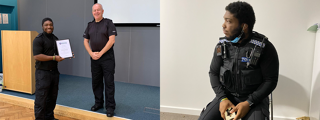From being called out to real-time incidents such as burglary to serving at the Queen's funeral, Criminology, Policing and Investigation alumnus, Devante, gives us a taste of what it's like to work in the force today.
What made you want to pursue a career in policing?
I have always wanted to make a difference in the communities I serve, which is cliche but very true. I wanted to create a better working relationship with ethnic minorities. I also love helping people and get an amazing feeling knowing that there are things I can do to completely change someone else’s life for the better.
How did you get into your current role?
I applied through the initial police learning and development program (IPLDP) which involved a lengthy process including a three-person panel interview and an assessment day. During the assessment day, you are required to complete a writing task, role play, teamwork activity, and a one-to-one meeting explaining what you know about policing and the force I was looking to join.
After completion of this, I was then sent to Sulhamstead, Reading for an initial training lasting 11 weeks (about 2 and a half months). During this training you learn the basics required for the role of a response officer in terms of using the radio with call signs, identifying different offences, how to arrest someone with the correct wording for the caution along with the process of what happens afterward.
Could you give us a bit of an insight into what you do now?
As a response officer, I deal with immediate response incidents – so anything that is called in through 101, but mostly 999. The type of incidents on a day-to-day basis can range from burglaries in progress, domestics, road traffic collisions, and missing people, to fights or medical incidents like cardiac arrests. I have so far dealt with a series of high-profile events such as working at Reading Festival, for Queen Elizabeth’s funeral, and then for King Charles's Coronation ceremony.
Criminology courses at BCU
Find more information about different Criminology related courses at BCU
What advice would you give students on how they can get to the position you are in career-wise?
I would recommend students to either contact the force they are considering a career with or a force local to them, so they can request a ride-along. This will allow you to experience what the life of a police officer is like from a civilian perspective.
Alternatively, if you like a more hands-on approach, then apply to be a Special Constable; you’ll be volunteering as a police officer (unpaid) and are given the same powers and responsibilities as a Police Constable on the front line. Due to this being a part-time role, you can complete this whilst studying or working in another job, so it allows you to see whether it is the job for you.
Do you have any interesting stories from your job that you can share with us?
Working for the Queen's funeral was an exceptional day that not a lot of officers will get the chance in their entire career to have experienced. From a 3 am start with kitting up and driving to Windsor, to standing on the road outside Windsor Castle entrance was truly unforgettable. It was arguably the biggest multi-agency event that the country has seen and probably will do for my lifetime.
What's been the highlight of your journey from BCU to your career now?
I believe a highlight of my journey would be going from completing mock interviews for assessments in my university classes, to now conducting them in real life in actual court cases. BCU helped me to mature and develop my social and critical thinking skills, which are now vital in my day-to-day role.
Why should students learn policing academically rather than through academy/ training?
I believe students should learn policing academically because it develops several skills like report writing, leadership, and time management. I would say academically studying helped me with my analytical thinking which transferred into how I deal with a variety of incidents on a day-to-day basis. A lot of Police Forces are moving towards changing entry requirements to include a degree or studying for one whilst being a police officer.
